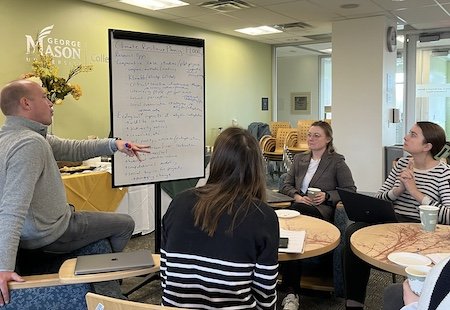Translating Research into Practice to Create Climate-Ready Communities Across Virginia
Mason’s Jeremy Campbell leads a discussion on local resiliency planning with staff from the Northern Virginia Regional Commission at a workshop held by the Virginia Climate Center in March 2023. Photo by VCC.
January 25, 2024. The Center for Climate Strategies (CCS) is pleased to announce a major new partnership with George Mason University (Mason) to leverage climate change expertise and university resources through a National Science Foundation (NSF) grant to support the creation of climate-resilient communities across Virginia. Mason was one of 18 schools to have been awarded ART grants. The NSF overall investment of more than $100 million will enable academic institutions to accelerate the pace and scale of translational research that will grow the nation's economy.
The NSF Accelerating Research Translation (ART) program will enable translation of research into real-world practical applications through cooperation on curricula, training, and project-based capacity building and technical assistance by faculty and professionals. The four-year cooperative agreement, “ART: Translating Research to Practice to Create Climate-Ready Communities Across Virginia,” will allow Mason, CCS, and other partners to work with local municipal governments and communities to produce and provide advanced, science-based solutions that create sustainable, community level resilience to the impacts of climate change. The University of Kentucky will serve as the project’s mentoring institution.
Leah Nichols, the executive director of Mason’s Institute for a Sustainable Earth, will serve as the project’s principal investigator. Tom Peterson, CEO for CCS, will serve as a co-principal investigator along with Jim Kinter, a professor in the Climate Dynamics PhD Program and the director of both Mason’s Center for Ocean-Land-Atmosphere Studies within the College of Science and the Virginia Climate Center; Celso Ferreira, an associate professor within Mason’s College of Engineering and Computing and the director of the Flood Hazards Research Lab; Luis Ortiz, an assistant professor in the Department of Atmospheric, Oceanic and Earth Sciences within the College of Science; and. MN Associates Inc. will monitor’s the program’s implementation and progress.
Improved front line community resilience to climate change requires advanced capacities and is critical to reducing loss and damage from climate change and capitalizing on the benefits of a more resilient economy. Universities and their partners can play a critical role by translating research to policies and practices and by providing stronger education, capacity building, and cooperative technical assistance.
GMU Press Release
CCS Virginia Projects Page

